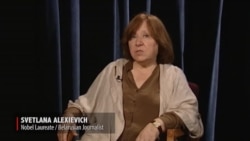Svetlana Alexievich, the Belarusian journalist and author of books on the impact of the Chernobyl disaster, the Soviet Union's war in Afghanistan, and Soviet and post-Soviet history, won last year's Nobel Prize in Literature for what the Nobel Committee called "her polyphonic writings, a monument to suffering and courage in our time."
She spoke with VOA’s Yulia Savchenko in Washington about this tragic history, and how its ghosts continue to haunt those living in what used to be the Soviet Union.
“We were romantics in the 1990s and thought that communism was dead,” Alexievich said. “But 10 years passed and Putin came, and it became obvious that the process is reversible; that communism will, to varying degrees, return again and again.”
WATCH: VOA interview with Svetlana Alexievich
Tragic testimony
Alexievich spoke about her books, which are based on the testimony of people who experienced these tragic historical episodes first hand.
“My idea was to write an encyclopedia of this period," she said. "I even found people who had seen Lenin, Stalin; who were in the [prison] camps, who were in Stalin's camps for 17-20 years; who had fought in the Great Patriotic War [World War II]. I seemed to be the right person in the right place to capture all of this. I think that, in the end, my narrative is more about the individual and utopia, about what happens to people when they want to build this premature heaven on earth.”
Noting that Russia was more “feudal” than capitalist in 1917, when the Bolsheviks seized power, Alexievich said it was “naïve” to think the country could move directly from feudalism to socialism and communism.
“But, as we know, the Bolsheviks had a slogan — it hung on one of the Stalinist [prison] camps: ‘With an iron fist, we will drive humanity to happiness!’ They probably thought they could do it,” she said.
'Sea of blood'
Rather than bringing happiness, this drive led to, Alexievich's words, “a sea of blood, a giant mass grave.”
Next year will mark the 100th anniversary of the Bolshevik Revolution that gave birth the Soviet Union. Asked about the significance of this anniversary, Alexievich said it “is nothing to be proud of.”
“But I like the words of [writer Varlam] Shalamov, who, after spending 17 years in Stalin's camps, said: ‘I was a witness to a huge lost battle for human happiness.’ It was an attempt at an alternative civilization, which, of course, failed. We failed in this [attempt]. That, I believe, is the reason to think about it: why we failed, why there was so much blood, why so many people disappeared … why these words ‘liberty, equality, fraternity’ have shed such rivers of blood.“







